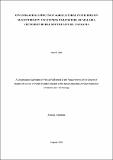| dc.description.abstract | The aim of this study was to investigate effects of agrochemicals on susceptibility and fitness of the
malaria vectors, An. gambiae s.l across farming areas in Tanzania. An exploratory mixed-methods
study was conducted to explore awareness on pesticide use among community members in four
villages (V1-V4) in south-eastern Tanzania. An. arabiensis larvae were collected from agricultural
fields in the same villages and their emergent adults examined for insecticide susceptibility, egg laying, and wing lengths (as proxy for body size). These tests were repeated using two groups of
laboratory-reared An. arabiensis, one of which was pre-exposed for 48hrs to sub-lethal aquatic doses
of agricultural pesticides found in the villages. Results revealed that farmers lacked awareness of the
linkages between public health and agriculture sectors but were interested in being more informed.
Agrochemical usage was reported as extensive in V1, V2 & V3 but minimal in V4. Similarly,
mosquitoes from V1-V3 but not V4 were resistant to pyrethroids, and either pirimiphos-methyl,
bendiocarb or both. Adding the synergist, piperonyl butoxide, restored potency of the pyrethroids.
Pre-exposure of laboratory-reared mosquitoes to pesticides during aquatic stages did not affect
insecticide susceptibility in emergent adults of the same filial generation. There was also no effect on
fecundity, except after pre-exposure to organophosphates, which were associated with fewer eggs and
smaller mosquitoes. In this study, susceptibility of mosquitoes to public health insecticides was lower
in villages reporting frequent use of pesticides compared to villages with little or no pesticide use. In
conclusion, safeguarding the potential of insecticide-based interventions requires improved
understanding of how agricultural pesticides influence important life-cycle processes and transmission
potential of mosquito vectors. | en_US |

